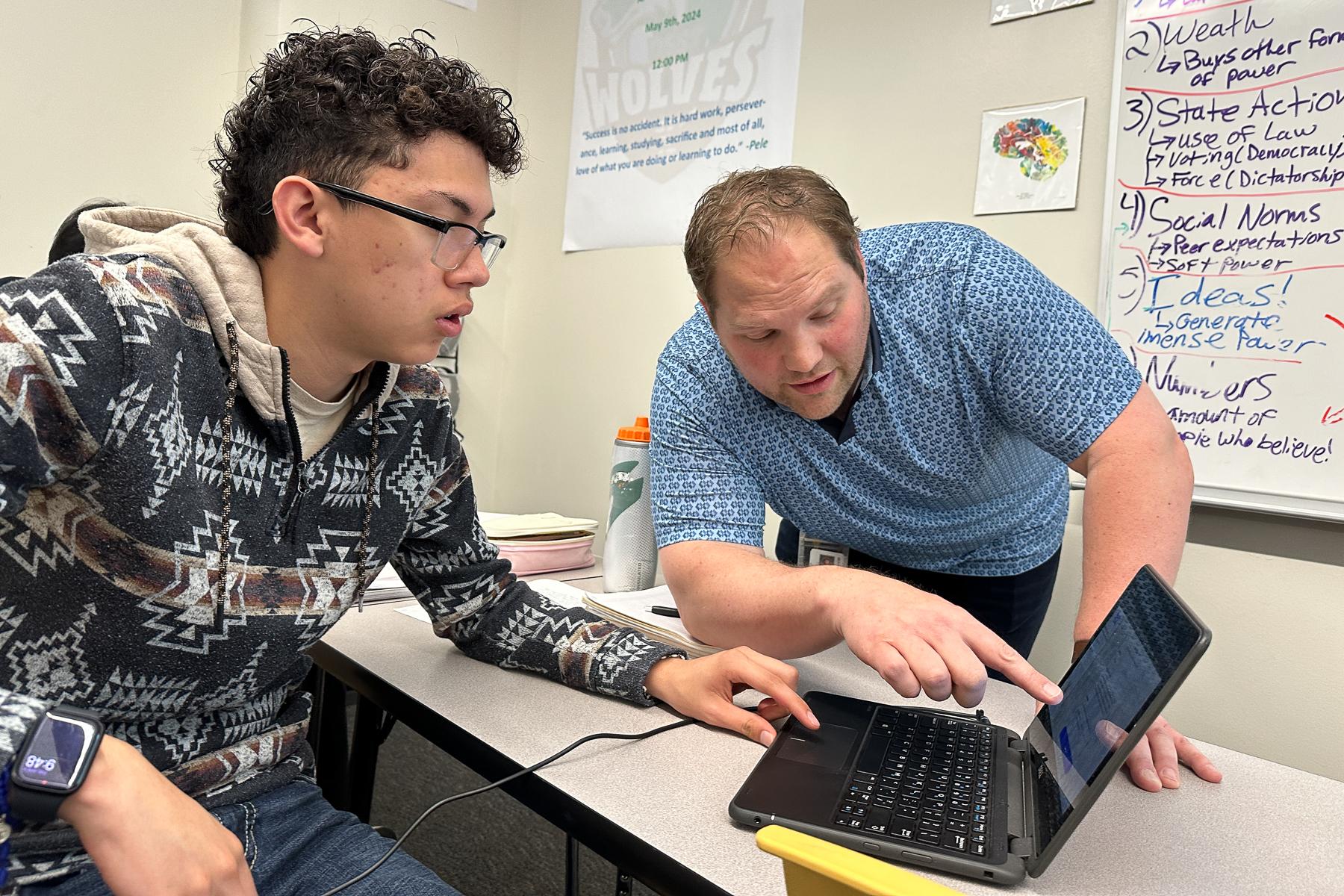Where’s the last place you’d expect to find fresh, healthy, made from scratch food?
If you said school cafeteria, you’d be wrong, at least in the dozens of school districts all over the state that are getting new training and transforming school food. CPR Health Reporter Eric Whitney has the story.
This is a transcript of Eric’s story
Reporter: Kathy Del Tonto has been working in school food service in Montrose for 30 years.
Del Tonto: My first kitchen that I managed was a little country school out south of town, and we made our own ketchup and everything.
Reporter: Quaint, but cooking from scratch wouldn’t last. Del Tonto, who now is food service director, says schools were encouraged to change with the times, and over the years that meant more fast food.
Del Tonto: The key buzzwords were participation to get more kids to eat so that your programs could make more money.
Reporter: Pizza, hamburgers and French fries certainly drew the kids in. DelTonto says processed food companies were right there with products kids wanted. And allegedly cheaper, too.
Del Tonto: By doing processed food you can cut your labor because you don’t have to do the hard cooking, or you’re just re-heating and that kind of thing.
Reporter: That’s been the model at schools across the country for decades. But three years ago the health-focused non-profit in Denver called LiveWell started helping Colorado schools switch back to scratch.
LiveWell sends teams of chefs, like Mike Shethar from Boulder, as expert consultants.
Shethar:(Addressing classroom): So what I want you guys to do is, we’re just going to trade recipes…(fade under)
Reporter: Today Shethar’s working with school kitchen managers in Grand Junction. He says lunchroom staff generally like the idea of using knives and following recipes again, not just opening cans and re-heating chicken nuggets.
Shethar: We’re able to come into these schools, really inspire people that’ve been fairly uninspired for the last couple decades and show them a just different path, and empower them.
Reporter: When the LiveWell program came to Montrose, school food veteran Kathy DelTonto didn’t actually want to be pulled down that path, cooking from scratch.
Del Tonto: I didn’t like somebody coming in and telling me I was doing it wrong. We were giving kids what they loved. We had huge lunch counts, they were happy, nobody was complaining.
Reporter: But Del Tonto went to a school food boot camp like the one Mike Shethar does and heard some cold, hard facts about the childhood obesity epidemic in America and Colorado.
Del Tonto: When I sat there in that classroom and knew the obesity rate had increased 30%, when I saw photos of kids and knowing that that generation doesn’t have the life expectancy that their parents – as a mom, that’s a shock and awe moment. I remember thinking in my head, if it’s not me, who’s it gonna be that’s going to take that on? And if not now, when?
Reporter: Two years later, Montrose schools has gone from serving 95% processed foods, to 95% foods made from scratch. Del Tonto’s buying more local food, and kids are getting more fresh fruits and vegetables.
That all sounds great to health campaigners, but of course they know the big test is whether kids will eat it.
So, how do the beef nachos on whole grain chips that kids at Montrose high are getting today look? I asked Ashley Henderson and Jesse Salazar.
EW: How’s the food?
Henderson 1: Depends on the day.
EW: How is it today?
Henderson 2: It’s OK, I’ve had better, but it’s not as bad as it can be some days.
Salazar 1: I don’t really like the cafeteria food. It made me puke one day.
Reporter: Teenagers can be tough critics. And today Jessie was eating a bacon cheeseburger from a fast food joint his mom brought him, not winning many points for nutrition.
Kathy Del Tonto says she’ll always be competing with fast food, especially with cheap pizza right across the street from Montrose High. She acknowledges fewer kids are eating school food since they switched to scratch cooking, but enrollment is down too so it’s hard to pinpoint the reason.
She’s confident, though, that in time, parents and kids will recognize that school food is a healthy, affordable alternative to fast food.
Del Tonto: I think we have to market our program better, but we need to realize we’re offering a healthy meal to students, that meet the healthy guidelines for students at whatever age that they are.
Reporter: There’s not a whole lot of experience yet with whether cooking from scratch is more or less expensive for schools. LiveWell says indicators are good, but companies that sell schools processed foods aren’t worried about going out of business any time soon.
Pawlak: Is this something that’s going to take over a more broad base? I think it’s going to be very difficult.
Reporter: Joe Pawlak is a school food industry analyst at a Chicago consulting firm. He says most schools still prefer the convenience of processed foods. And, thanks in part to new federal nutrition guidelines, those foods are changing.
Pawlak: There are processed foods that are good for you. Just because they’re processed doesn’t mean that it’s bad. There are processed foods that have no preservatives, no additives, natural ingredients.
Reporter: Back in Montrose, Kathy Del Tonto stands by her decision to eliminate processed foods whenever possible. It comes with a significant start-up cost to re-equip kitchens and re-train staff. LiveWell and the Colorado Health Foundation are giving 82 school districts more than $4 million to help with that. And to find cost savings to make scratch cooking sustainable.
Del Tonto: We were buying canned pinto beans. I went back the next year and we bought all local pinto beans, dried pinto beans. The savings was $19,000. And the crazy thing is, is the kids absolutely love the beans. They notice the flavor difference.
Reporter: Its going to be a few years, still, until its clear whether cooking from scratch saves schools money, or costs them more. Kathy Del Tonto, with her 30 years experience, is still sorting things out, but is confident that she can make the transition work.
[Photo: School District 51]









